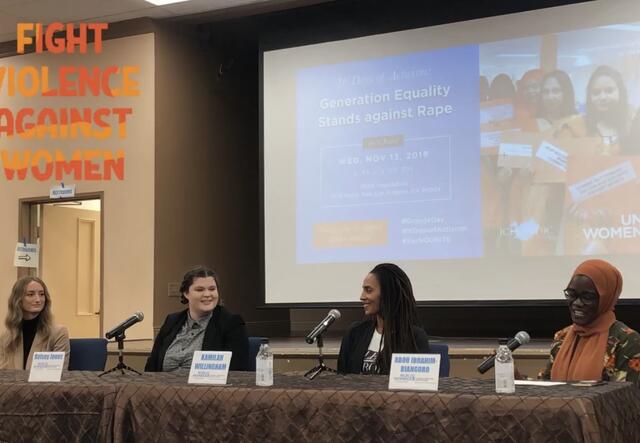In honor of the International Day for the Elimination of Violence Against Women on November 25, I had the privilege of speaking alongside several women about the prevalence of gender-based violence and what we can do to end it. For 16 days, from November 25 to December 10, the international community will be taking a stand against the pervasive violence that surrounds women and girls with its 16 Days of Activism against Gender-Based Violence campaign. Here at the IRC, we know that 16 Days is Not Enough.
16 Days is Not Enough not just because women and girls experience violence 365 days out of the year, but because the structures of power that enforce inequality and allow impunity do not rest. And the activists, humanitarians, caseworkers, and IRC staff who challenge and fight these norms every day do not rest either.
Although all women can be subject to gender-based violence, certain women face additional inequalities. Women of color and those in the LGBTQ community face increased rates of violence, and those who are displaced and in war zones are at a double disadvantage. Not a single country is on track to meet the sustainable development goals of 2030, but women in conflict states are the farthest behind. Rape is widely and systematically used as a weapon of war, such as in the Rwandan genocide in the early 90s, and sexual violence is often used as a tool of torture, such as in the documentation of hundreds of women being tortured for confessions in Mexican prisons. Additionally, gender-based violence is not only a reason why some women are forced to flee their homes in the first place, it is also a reality many women face along their journey to find safety as well. Along some migrant routes, more than half the women surveyed experienced sexual assault.
The IRC recognizes that women and girls experience gender-based violence differently in times of peace and war, and that refugee women are at increased risk of violence. For this reason, over the past several years the IRC has made addressing gender-based violence, and the structural inequalities that drive it, its top priority. Gender equality is central to measuring the success of each of its programs. Measures have not only been taken internationally to ensure safety and well-being, such as in our Women and Girls Protection program, but also domestically in our U.S. programs.
Here at the IRC-LA, we have taken several measures to ensure gender equality in our programs. We have added the requirement for every woman in the household to sign paperwork and be present at all casework meetings, ensured women are adequately trained to take public transportation or drive, and provided financial education to women to promote their economic empowerment. All of this work has been crucial to ensuring conditions that permit inequality do not prevail once a woman makes it to safety. In our Immigration department, we have recently added U- and T-Visas to our services to help protect female survivors of violence and trafficking, ensuring vulnerable women are not returned to even more dangerous situations. In our Unaccompanied Children program, we ensure that young girls who have crossed the border by themselves feel safe and secure in their new communities, are enrolled in school, and are receiving the medical or mental health services they need in order to rebuild and recover.
As the IRC continues to ensure that women are protected in emergency settings and their needs are met once they reach safety, the international community cannot abandon those still in harm’s way. There are still women stuck in war zones in Syria and the DRC, and there are girls in the Northern Triangle who suffer domestic and gang violence with impunity. It is crucial that to protect all women and girls, the international community takes a stand alongside the IRC to support the rights of refugee women and girls every hour of every day.
Carly Boos, Volunteer Coordinator
